A Brief History of Equality, interview with Thomas Piketty
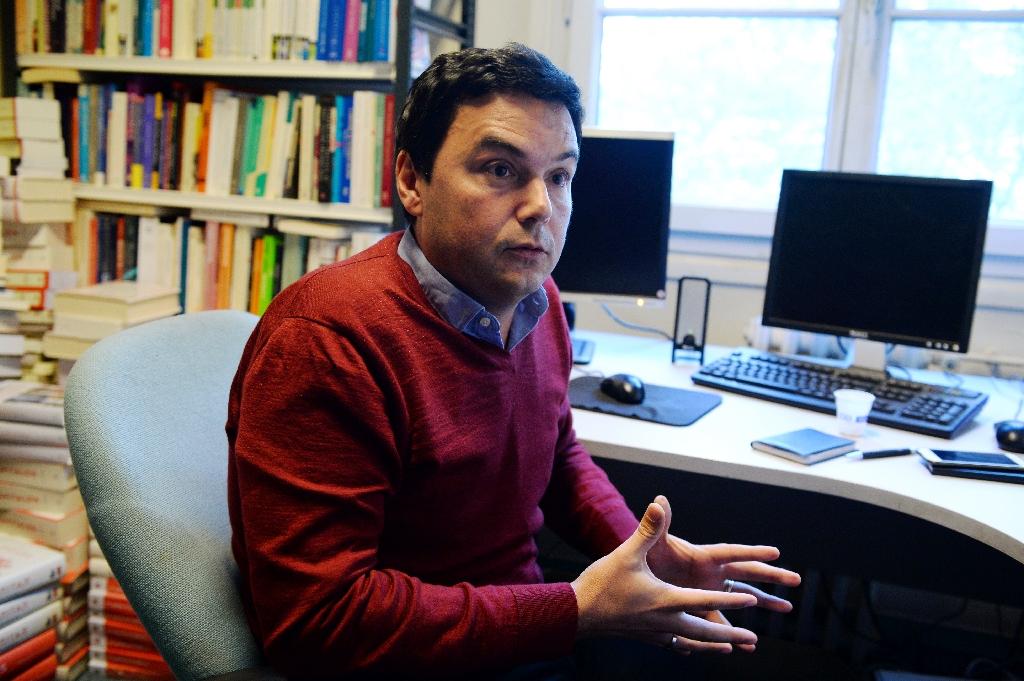
Thomas Piketty is Professor at the École des Hautes Études en Sciences Sociales (EHESS) and the Paris School of Economics. He is also Codirector of the World Inequality Lab. In 2014 Piketty published Capital in the Twenty-First Century — Thomas Piketty | Harvard University Press. It sold over 2.5 million copies—and largely focused on income inequality. Piketty has published a number of books in the interim, including: Capital and Ideology Capital and Ideology — Thomas Piketty | Harvard University Press (2019), and, Time for Socialism (2021) Time for Socialism (yale.edu). The prolific author and economist has just published A Brief History of Equality A Brief History of Equality — Thomas Piketty | Harvard University Press. Optimistic in and tone and content, its central argument is built around a simple message: there has been a general trend towards global equality— particularly in Europe— between the end of the 18th century and today.
Your latest book argues that the history of equality is not a peaceful history. How have revolts, revolutions, social struggles, and crises helped and hindered the history of equality?
The movement towards more equality is not without setbacks. It’s not a linear or a deterministic process. In every period, you have some kind of setback phenomenon, which often comes from a nationalist identity crisis, and sometimes it involves a lot of violence, destruction, and even new forms of inequality too.
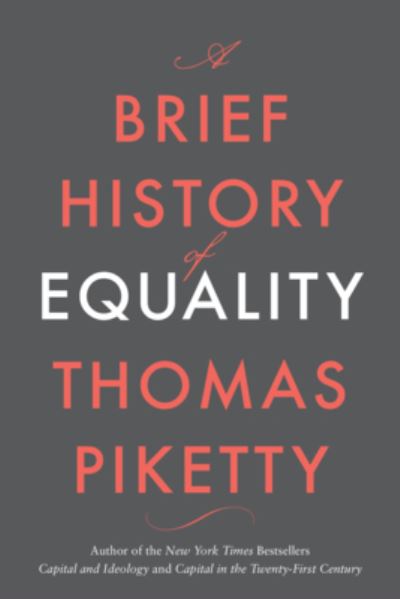
Russia’s war of aggression against Ukraine is a good example. The European Bank for Reconstruction and Development says the war has triggered ‘greatest supply shock’ in 50 years. And the economies of Russia and Ukraine will shrink by 10 percent and 20 percent respectively in 2022. Where do you see the historical roots of this war: the breakup of the Soviet Union in 1991?
Well, it was a miracle that the split of the Soviet Union in 1991 did not happen with more drama. One form that social justice and more equality takes, in the long term, is the construction of democratic spaces and a large democratic federation, belonging to a large political community, rather than a small tribe. This helps construct better institutions, and more equal access to infrastructure, and education. But when these large political entities disappear, like the Soviet Union, or, say, the former Yugoslavia, they turn into a crisis. Rebuilding this large political fracture is never an easy process. In the Soviet Union it looked initially as if this happened peacefully. But we can now say that the frontier between Ukraine and Russia, in fact, was not settled.
Look, collectively, we could have done better [as a global community]. Russia’s political development since the fall of the Soviet Union is a big drama. [The Russian Federation] has been subjected to a level of oligarchic and kleptocratic transformation. This was the country that pretended to abolish private property during the 20th century. And then it suddenly became the world capital of tax oligarchs and kleptocrats. The [war in Ukraine] that we see today is, to some extent, a way to make Russian people forget about all of these lies. Namely: that people close to Putin have been stealing resources away from Russians for a very long time. It’s very sad. The human consequences are absolutely terrible.
How will the western imposed sanctions hitting the Russian economy influence the war in the medium to long term? Also, what consequences will it have for the Putin regime?
I’m not sure the sanctions that we [ in the west] claim to take against wealthy Russian oligarchs really have much impact. We’re not putting enough effort to actually target the oligarchs. [In the west] we have largely taken symbolic measures, which only target a few wealthy Russians. Whereas it should actually be tens of thousands of Russians. According to the data we have in the World Inequality Database Russian Federation – WID – World Inequality Database, you have about 20,000, Russians who own more than 10 million euro in net wealth. It’s still a very small group. But it’s much, much bigger than a few hundred individuals. If the west really wanted to target the oligarchic class that has benefited from the Putin regime in Russia, they would need to target tens of thousands of wealthy individuals, rather than just a few hundred. Targeting those kinds of numbers could make a big difference to put pressure on the regime. It would show the Russian people, and international public opinion, that we are serious about social justice, democracy, and transparency.
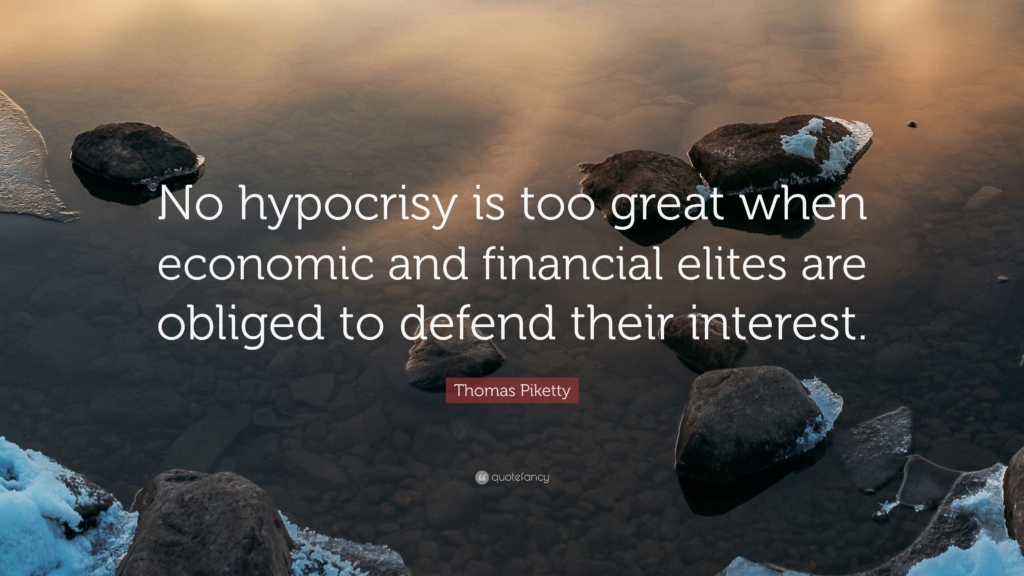
Is there a sense that the west is engaging in a lot of hypocrisy on this issue? After all, they took dirty Russian money into their respective economies for many years.
Indeed, there’s a lot of hypocrisy. Because most of this money was stolen from the Russian people. It was then invested in western financial institutions, and into real estate markets in Paris, London, and New York. Then suddenly we say, there is a war: oh, we need to do something about this.
We really need to change the way assets are registered [globally] and need a lot more transparency about who owns what. Everywhere. This [war in Ukraine] is crazy, and a human disaster, but it should, ideally, accelerate the movement towards more transparency in asset ownership [around the globe]. I’m not sure if we will do it. So far, our governments [in the west] threaten the oligarchs, but they only do it for a few hundred. It’s completely symbolic.
You also write about how the legal systems of many countries in western Europe – particularly in Britain— have protected Russian oligarchs for many years.
We have designed legal systems in the west which are protecting the oligarchs from all countries: from Russia, from the west, and from China. If you are a normal Russian and lose half of your pension, or half of your wage, because of the depreciation of the ruble, and because of inflation coming from western sanctions, there’s nothing you can do. There is no court or tribunal to which you can turn to and complain. But if you own a 100 million euros, in London, or Paris, and we try to take away half of your wealth, then you can go to court for months, and nothing will be taken away from you for many years. We think this legal protection for the super-rich is normal, but it’s not. We have built a legal system [in the west] that is designed to protect the wealthy rather than to protect ordinary people. This war in Ukraine and the sanctions that have followed exemplifies these contradictions. Ideally, we could learn from this crisis. But I don’t know. We’ll see.
Equality, you write in this book, “is a social construct”? What exactly do you mean by that?
What I show in this book is that, in the long run, there is generally a move towards more equality.
Particularly in Europe between the end of the 18th century and today. It’s largely a social construct in the sense that it was the result of a large number of political mobilizations and transformations, including revolutions, and social struggles. The move towards equality is not a natural phenomenon. It’s a long run trend, grounded in history.
You mention two revolutions in the late 18th century: the French Revolution (between 1787 and 1799) and the slave revolt in St Domingue in 1791.What impact did they have in moving the world towards more equality?
These two events now represent the beginning of the end of aristocratic societies on one end, and slave and colonial societies on the other. This is the beginning of a long run process, which continued in the 19th and 20th century. [The benefits] of social security, and progressive taxation then followed. This is continuing today with social equality movements like #metoo and #black life matters. We are not there yet in this movement towards more equality. We have made progress in the long run. Although racial discrimination and gender inequality are still a problem. This movement started a long time ago. It can, and should, continue, if we want it to. But we first need to take stock of how it happened and how it worked.
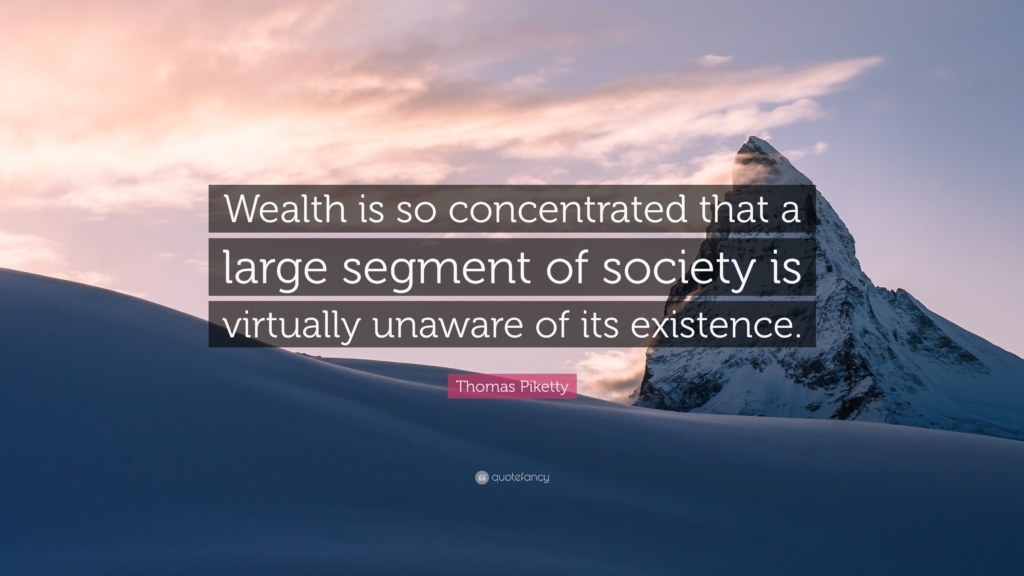
This book cites numerous examples of other historical changes. Like, for instance, the setting up of the NHS The Birth of the NHS – Historic UK (historic-uk.com) after the Second World War in Britain. You also note how after the First World War property ownership increased for both working and middle-class people across several countries. You seem to be coming back to the same point: that equality increases after a monumental political event, which often involves violence.
Yes. But it also depends on the legal, educational, and electoral institutions which are being discussed before the crisis. Take the Bolshevik revolution, in Russia, in 1917, for example. It completely changed the balance of power between the elite and the rest of the population. But in the end, it was a disaster for the Russian population, because the institutions that the Bolsheviks wanted to put in place were not good institutions. So it’s very important after this gigantic failure of Soviet communism to re study this history of the 20th century, and make the difference between the institutions that worked, and those that didn’t work. That is what I’m trying to do in this book.
Can we say crises and revolution inevitably lead to more equality and more emancipation?
I’m not saying: all you need is a big crisis, and a revolution and equality will inevitably follow. That would be stupid. Think of all the unproductive and negative revolutions that happened during the 20th century. What I do show, however, is that you need to have big mobilization to break the resistance of the elite. Because they will always try to protect their position. This is as true with a billionaire today as it was with the aristocratic class during the French Revolution. You always need mobilization, and sometimes a crisis to sort of challenge this balance of power. But this is not enough. It’s really important to think about how to build better institutions. During the 20th century, this was a mixture of welfare state construction, progressive taxation, and gradual decommodification of bigger and bigger segments of the economy. The economic systems that we have today have very little to do with capitalism of, say, 100 years ago. The entire legal, social, and fiscal system has gone through enormous transformation over the past century. Even more so if you go back to the end of the 18th century. This long-running revolution is going to continue. I try to focus on the long run perspective.
So globally you remain optimistic that we are heading towards more equality and social progress?
We need to be optimistic. We tend to forget that all these great achievements of the past. Because in the end, it’s in our hands: it’s not something that’s going to happen just out of nowhere. It really depends on our collective organization and capacity to fight in order to make these transformations happen.
You discuss two radical concepts in this book. Inheritance for all From basic income to inheritance for all – Le blog de Thomas Piketty (lemonde.fr), and, a basic universal income. How would these ideas work in practice?
If you look at the distribution of wealth from the 19th century until today, what’s really striking is that
income distribution has become relatively more important. But wealth distribution is still very, very unequal. Let me give one example. If you look at the bottom 50 percent of the population, in a country like, say, France, Britain, or Ireland, less than five percent owns almost all of the total wealth. Whereas the top 10 percent own 60 percent of the wealth. In the US it’s about 70percent, and about 75 percent in Latin America and Sub-Saharan Africa. The question is: what can you do about it?
One possibility would be to say: okay, we just need to wait for market competition to spread the wealth around. But it’s so slow. And we’re going to have to wait forever if we want to see an improvement. Another possibility would be to say at the age of 25 every individual could receive a minimum level of inheritance. So let’s say the inheritance was 60 percent of average wealth in the society of each respective country. The average wealth in France today is 200,000 euros. So imagine every individual receives, say, 120,000, euros from [the state] at the age of 25. That would be the bottom 50 percent of society each receiving that sum. And people in the top 10percent, (who today receive, on average, 1 million euro, in inheritance wealth, after tax) they would potentially [in this proposal] still receive about 600,000 euros. But let me make it clear: even after this proposal we would still be very far from complete equality. But nevertheless, we could go much further in that direction.
But would it be feasible to implement? It sounds rather utopian.
It would not be easy, certainly. But what I find a bit paradoxical is that everybody claims to be very attached to the principle of equal opportunity, equal rights, etc. But if you try to move more concretely in the direction of equal opportunity, like, say, having a minimum inheritance for the bottom 50 percent, then people at the top get completely mad, and say, it’s not possible.
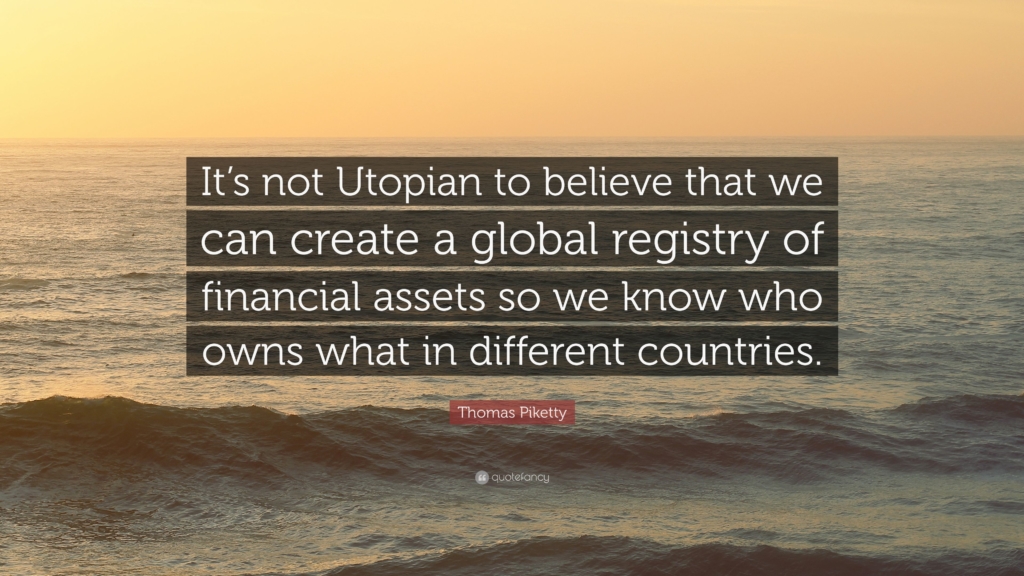
Do you think giving a 25-old year such large sums of money would really benefit them?
We could, of course, put limitations on what people would do with the money. But then you also need to apply the limitations to rich children too. Because the idea that rich children always make good choices with the money is crazy. This is not going to happen easily. But nothing in the past happened easily. In the beginning of the 20th century if you had told most people in Britain about the NHS they would have said: this is communism, it cannot happen. But today in Britain, even the Conservative Party is raising taxation to put more money into the NHS.
What is the best solution to tackling climate change as a global community in the coming months and years ahead? Is The Green New Deal What Is the Green New Deal? A Climate Proposal, Explained – The New York Times (nytimes.com) a plausible option? And does it take an egalitarian approach to carbon emissions?
So far the two proposals for the Green New Deal are not sufficiently ambitious. To reduce global warming, we will need much more than is being currently discussed. People in the bottom 50 percent will never accept a carbon tax, or any major change in their lifestyle if you don’t start convincing them that the people at the top have made drastic efforts too. Because there is still huge inequality with respect to carbon emissions. So, for instance, if you take the bottom 50 percent in Europe today, their average carbon emission is okay. But if you take ten the top percent, they emit much higher amounts of carbon emission. Trying to get everyone to reduce their carbon emissions, together, in the same way, is not going to work. Unfortunately, we may need to see much more catastrophes in our daily life for people to change their minds about this. If, and when, this political crisis comes, political attitudes to equality can change very fast.
How do you see the rise of China changing the global geopolitical and economic landscape in the coming years ahead? The Chinese state is liberal, economically. But it remains authoritarian on issues like human rights, censorship, human dignity, and freedom of speech.
China is a real challenge for the west. The proper response to the Chinese challenge is to continue the movement towards social democracy, a more equal distribution of power in society, a more decentralized political system, and more workers rights. If we don’t move in this direction in the west, there is a serious risk that China will become more influential in Africa, Asia, and all over the world.
In the west we tend to be very proud of our achievements in equality, like the welfare state and so on. But we forget that much of it came from exploitation of the rest of the world. China is very good at pointing out how their country did not develop through colonialism. The historical record, so far, it is that it is the west that has been incredibly greedy, in terms of exploiting the rest of the world.
Let me conclude with one example. When we talk about international tax reform, we need to split and share the tax revenues, not only between the rich countries. But with respect to the global south too. Right now, rich countries try to take away some of the profits in tax havens, including, for instance, Ireland. And they split the profits between themselves. If you look at countries in the global south, especially countries in sub–Saharan Africa, they get almost zero out of this. We should have at least a fraction of the tax revenues coming from the most powerful economic actors in the world, going towards the global south, which should then be divided according to population. If we don’t do something like this, it will be China who will come with their money to pay for the investments [for many countries across the globe]. If this happens, the world will become less transparent and less democratic. The Chinese challenge, together with the fight for more global economic justice, and the fight against global warming, should help move the world towards more equality in the decades to come.

This is all very well. The sort of politico-economic change to reduce inequalities that Piketty advocates might well save capitalism, but he doesn’t anywhere in his book (or the earlier books it summarises) describe any practical solutions for achieving that change. How on earth would you institute and progressively increase a global task on wealth? You’d some sort of Žižekian world government to be able to do that, and that’s not going to happen.
Also, how does he square his extremely prescriptive ‘command’ macroeconomics with his call for a more laissez-faire participatory democracy?
Capitalism’s f*cked. Its own internal logic tends to accumulate wealth into fewer and fewer hands to the growing impoverishment/degradation of its productive forces, which is a tendency that can’t be bucked and is ultimately unsustainable. Rather than dreaming up impractical ways to save capitalism, we should be smashing its windows and kicking in its rotten doors.
Agreed. He’s not a revolutionary or even a political economist in the critical tradition of Marx, Smith, Veblen, Polanyi et al. He’s an economist in the mainstream marginalist / mathematical economic tradition with a few quirks. Lots of nice data which allows the problem to be described but look elsewhere for answers.
Good review by an economic anthropologist of the original book here:
http://aotcpress.com/articles/faces-thomas-piketty-reflections-1-bestseller/
“We should be smashing its windows and kicking in its rotten doors.” So what “practical solutions for achieving that change” are you yourself suggesting?
My reading of this interesting interview is that Piketty identifies a long term trend towards greater equality, which he describes as grounded in history and the result of manifold struggles and upheavals. This is a positive message which contrasts with the doom and gloom that otherwise besets us; I hope he is right. Certainly, ideas like Universal Basic Income, which not so long ago sounded hopelessly Utopian, are beginning to make their way into practical politics. I think that this analytical framework can help to underpin a practical, progressive, transformative agenda that can achieve some traction, and so should be welcomed rather than dismissed.
There’s no ‘magic bullet’ that will reduce the ever-growing wealth inequalities that threaten capitalism. Yes, a progressive global tax on wealth might in principle head off the crisis of increasing global impoverishment in both human and environmental terms that will bring capitalism down. But, in practice, such a tax is never going to happen. To imagine a regime in which such a tax could be implemented is wishful thinking.
Piketty’s empirical research does (arguably) identify a long term trend towards greater equality. But this analysis is hardly uncontroversial; other analyses of the same data are possible. Piketty’s analysis is also based on a limited data set that pertains only to so-called ‘developed’ countries. If we in the ‘North’ are tending towards greater wealth equality, that might only be at the expense of the greater human and environmental impoverishment of the ‘South’. You can’t legitimately extrapolate a global trend from what’s essentially a trend that’s local to the ‘North’. The global trend might still be towards greater inequality and growing human and environmental impoverishment and degradation.
The transformative agenda can’t be prescribed or engineered or magicked away ahistorically; it will emerge historically and organically and in unpredictable ways from the manifold struggles and upheavals that increasing global impoverishment will produce. And if it doesn’t – if our sociocultural anthropology fails to adapt in response to the material conditions that the contradictions inherent in capitalism produce; that is, unless we evolve – then we, like capitalism, are f*cked.
My ‘solution’ or activism (before I retired) was to help the communities in which I was embedded to develop through unionism the resilience and independence they need to survive the failure of capitalism and the emergencies that flow from that failure. That remains the practical solution for achieving the required change that I’m suggesting.
Thanks for the link. That’s an interesting anthropological perspective. (Chris Gregory’s work on indigenous exchange relations as an alternative economic model to the market economy in his book Gifts and Commodities is itself an interesting piece of work.)
Piketty’s work in gathering empirical data on income and wealth inequalities is without a doubt important. However, he feeds that data into abstract models which lose sight of the organic, interrelated reality of our economic processes and rather ignore the ways in which economies are embedded in society and culture.